Source:

BUSINESS DAY TV: Nampak to focus on greenfields growth in rest of Africa, says CEO
by Transcript service,
November 30 2015, 17:52
BUSINESS DAY TV: Nampak to focus on greenfields growth in rest of Africa, says CEO
ANDRÉ de Ruyter is CEO of Nampak
BUSINESS DAY TV: Nampak’s full-year trading profit gained 10% as Nigeria and Angola offset production setbacks at some operations in its home market of SA. But the business also took a R141m hit in a foreign exchange loss as a result of liquidity constraints in these two territories. Joining us now on News Leader for a look at the numbers is Nampak’s CEO, André de Ruyter.
André...so as stellar as the numbers are it seems that SA versus the rest of Africa is how we’ve got to look at your year-end results because it highlights how prominent a feature the rest of Africa has become for Nampak.
ANDRÉ DE RUYTER: Correct. Trading income out of the rest of Africa grew from 37% of total group trading income to 49%, so close on half now and we demonstrated a 43% increase in both revenue as well as in trading income from our trading operations in Africa, which we think vindicates our African strategy in spite of short-term turbulence.
BDTV: You did have a couple of operational issues in SA though, particularly in the glass operation which you say turned the corner in the second half and has continued to turn the corner coming into the beginning of the new financial year. So with that and less spoilage at Bevcon would you expect SA to play a bigger role going forward in that 49% and perhaps track back a bit?
ADR: Absolutely. Even though we expect continued growth in profitability from our African operations we expect a resurgence from our South African operations. Glass is going to deliver handsomely to the bottom-line in the current financial year...we are very confident of that and the Bevcon spoilage issue, if any impact, it will have a very minimal impact on the numbers.
BDTV: And that offsetting then some of the challenges you have faced on the continent specifically because it hasn’t been all smooth sailing. You’ve taken a forex hit, having experienced issues in key markets like Nigeria and Angola. So talk us through that and exactly how it’s come to bear on operating margins?
ADR: It’s important to recognise that we sell our products in the local currency. So we sell in naira and in kwanza and we then convert the naira and the kwanza into dollars, which we then take out of the country to repay loans and debt and also to pay for raw materials. Now once these profits are delayed in terms of their expatriation from those countries there is a timing risk relating to a potential devaluation of the naira and the kwanza and that’s exactly what happened.
And as a consequence we booked a forex loss of R141m as a result of that delay in obtaining sufficient hard currency to take the money out of those two countries. But having said that, it’s important to emphasise that the margin that we make in Africa is 18.7% and even after adjusting for these forex losses, and taking away the R141m we would still have made an operating margin of 15.7% which is 2.5 times greater than the margins we’re able to make in SA.
BDTV: How do you work around this though, going forward because this is likely to be an issue in this current year as well...we had that strong dollar, we do have African currencies under pressure due to the fall in commodity prices, so how do you work around that?
ADR: We are working very closely first of all with the central banks in those countries as well as with the Departments of Trade and Industry and I must say there’s a lot of sympathy and understanding for the situation that we find ourselves in. Both those countries are very keen to diversify away from oil and encourage the manufacturing sector and we’re one of the pioneer investors in that sector in both those countries. But having said that, there is still a challenge.
We don’t think the magnitude of the problem is too serious. We have an amount of $700m in those two countries but you need to deduct from that amount the normalised working capital. So in the event of a complete catastrophe we expect, and if those two currencies were to devalue by say 30% in one fell swoop, we expect a further potential impact of around R150m.
BDTV: Okay, so you’re more optimistic than not on your Africa operations to the extent that you are looking at growing that exposure even more so. You’re looking at greenfield glass operations not only in Nigeria but Ethiopia as well. When it comes to the capex spend you’re looking at...you’ve spent about R2.2bn so far on capex...how much of that is skewed to the rest of Africa versus SA right now?
ADR: We have been spending about 60% of that capex spend in SA, and that is mainly to do with the replacement of our old and outdated tinplate beverage can lines with the latest generation aluminium lines. That process is now by and large complete so now the focus is going to be on greenfields growth in the rest of Africa.
BDTV: Is it fair to look at Nampak as an economic indicator...perhaps an early indicator of where the economy is going because I suppose you have to make the packaging before you can fill them with goods and sell them. How are you seeing the economy at the moment...is it as tough as many companies are saying it is out there?
ADR: We are not that concerned about our volumes. We’ve demonstrated 10% year-on-year volume growth in beverage cans for example. We can sell every bottle that we can make in the glass business, and in the food can business we are benefiting from the export drive of South African food manufacturers who are benefiting from the weak rand to build their businesses into the rest of Africa.
ANDRÉ de Ruyter is CEO of Nampak
BUSINESS DAY TV: Nampak’s full-year trading profit gained 10% as Nigeria and Angola offset production setbacks at some operations in its home market of SA. But the business also took a R141m hit in a foreign exchange loss as a result of liquidity constraints in these two territories. Joining us now on News Leader for a look at the numbers is Nampak’s CEO, André de Ruyter.
André...so as stellar as the numbers are it seems that SA versus the rest of Africa is how we’ve got to look at your year-end results because it highlights how prominent a feature the rest of Africa has become for Nampak.
ANDRÉ DE RUYTER: Correct. Trading income out of the rest of Africa grew from 37% of total group trading income to 49%, so close on half now and we demonstrated a 43% increase in both revenue as well as in trading income from our trading operations in Africa, which we think vindicates our African strategy in spite of short-term turbulence.
BDTV: You did have a couple of operational issues in SA though, particularly in the glass operation which you say turned the corner in the second half and has continued to turn the corner coming into the beginning of the new financial year. So with that and less spoilage at Bevcon would you expect SA to play a bigger role going forward in that 49% and perhaps track back a bit?
ADR: Absolutely. Even though we expect continued growth in profitability from our African operations we expect a resurgence from our South African operations. Glass is going to deliver handsomely to the bottom-line in the current financial year...we are very confident of that and the Bevcon spoilage issue, if any impact, it will have a very minimal impact on the numbers.
BDTV: And that offsetting then some of the challenges you have faced on the continent specifically because it hasn’t been all smooth sailing. You’ve taken a forex hit, having experienced issues in key markets like Nigeria and Angola. So talk us through that and exactly how it’s come to bear on operating margins?
ADR: It’s important to recognise that we sell our products in the local currency. So we sell in naira and in kwanza and we then convert the naira and the kwanza into dollars, which we then take out of the country to repay loans and debt and also to pay for raw materials. Now once these profits are delayed in terms of their expatriation from those countries there is a timing risk relating to a potential devaluation of the naira and the kwanza and that’s exactly what happened.
And as a consequence we booked a forex loss of R141m as a result of that delay in obtaining sufficient hard currency to take the money out of those two countries. But having said that, it’s important to emphasise that the margin that we make in Africa is 18.7% and even after adjusting for these forex losses, and taking away the R141m we would still have made an operating margin of 15.7% which is 2.5 times greater than the margins we’re able to make in SA.
BDTV: How do you work around this though, going forward because this is likely to be an issue in this current year as well...we had that strong dollar, we do have African currencies under pressure due to the fall in commodity prices, so how do you work around that?
ADR: We are working very closely first of all with the central banks in those countries as well as with the Departments of Trade and Industry and I must say there’s a lot of sympathy and understanding for the situation that we find ourselves in. Both those countries are very keen to diversify away from oil and encourage the manufacturing sector and we’re one of the pioneer investors in that sector in both those countries. But having said that, there is still a challenge.
We don’t think the magnitude of the problem is too serious. We have an amount of $700m in those two countries but you need to deduct from that amount the normalised working capital. So in the event of a complete catastrophe we expect, and if those two currencies were to devalue by say 30% in one fell swoop, we expect a further potential impact of around R150m.
BDTV: Okay, so you’re more optimistic than not on your Africa operations to the extent that you are looking at growing that exposure even more so. You’re looking at greenfield glass operations not only in Nigeria but Ethiopia as well. When it comes to the capex spend you’re looking at...you’ve spent about R2.2bn so far on capex...how much of that is skewed to the rest of Africa versus SA right now?
ADR: We have been spending about 60% of that capex spend in SA, and that is mainly to do with the replacement of our old and outdated tinplate beverage can lines with the latest generation aluminium lines. That process is now by and large complete so now the focus is going to be on greenfields growth in the rest of Africa.
BDTV: Is it fair to look at Nampak as an economic indicator...perhaps an early indicator of where the economy is going because I suppose you have to make the packaging before you can fill them with goods and sell them. How are you seeing the economy at the moment...is it as tough as many companies are saying it is out there?
ADR: We are not that concerned about our volumes. We’ve demonstrated 10% year-on-year volume growth in beverage cans for example. We can sell every bottle that we can make in the glass business, and in the food can business we are benefiting from the export drive of South African food manufacturers who are benefiting from the weak rand to build their businesses into the rest of Africa.


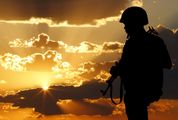
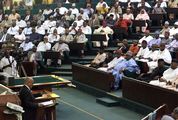
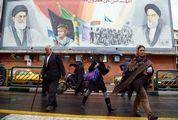
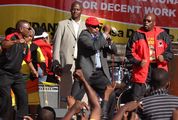


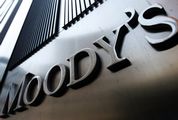
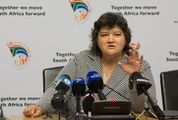


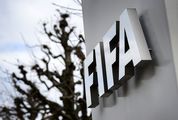








Login OR Join up TO COMMENT